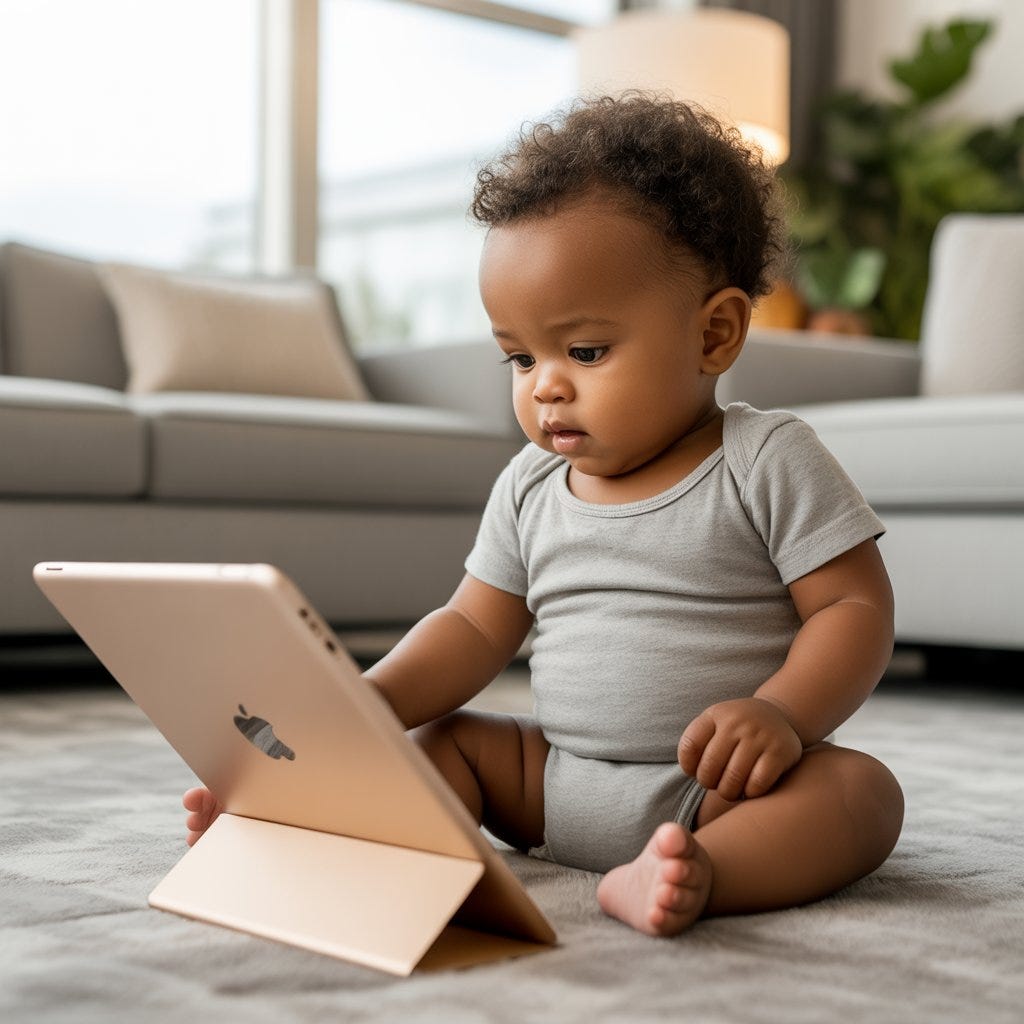I’m shocked that we’re still debating whether screens are harmful to babies and young children in 2025. Seriously? I can’t cover everything about this topic in one piece, but let me share something from my thoughts.
Here’s what always gets me: Adults — and I’m talking about supposedly self-aware adults — are living through their own screen addiction hell. They know exactly what endless scrolling is doing to their brains, their sleep, and their relationships. Yet somehow, they think it’s perfectly fine to hand an iPad to their babies and toddlers who are just making sense of the world? Make it make sense.
The research is screaming at us. Study after study shows that excessive screen time in preschoolers (0–4/5 years old) destroys sleep quality, creates hyperactive kids who can’t focus, and turns little children into emotional wrecks.
The correlation between screen time and attention problems isn’t subtle — it’s significant. And I’ve seen it with my own eyes. There are children out there who literally cannot sit still unless there’s a screen glowing in front of them. It’s not their fault. Their parents rewired their brains that way. Let that sink in.
Want to know what’s really breaking my heart? Children starting reception school — four and five-year-olds — who can’t climb stairs. Can’t tell their teacher when they need to use the toilet/bathrooms. I’ve personally witnessed kids between 9 and 12 who can’t bathe themselves or get dressed properly. And don’t even get me started on preschoolers whose vocabularies are stuffed with American slang because they’ve been raised by American movies and Disney+.
Unfortunately, by the time you see these devastating effects, the damage might be irreversible. Think about that for a second. Irreversible, because there’s an age where a child's brain has stopped building and only what we have put there when they are little will be left. Whatever damage we have done will be permanent at that stage.
Parents will say, “But my baby gets bored without screens!” Really? Since when did boredom become the enemy? Boredom is a gift! It’s literally the foundation for developing attention — the kind of deep, sustained focus that actually matters in life. Without constant digital stimulation, children learn to entertain themselves, develop genuine curiosity, and build the emotional resilience they’ll need to thrive.
We’re living in the most distracted era in human history, and attention has become our most precious currency. There is more than enough information out there to last five lifetimes. So, if you are wired to respond to all kinds of attention, your life will not matter much. This is what we’re doing to our children when we raise them on screens.
The people who will lead tomorrow are the ones who can sit with boredom today, who can think deeply, who can engage with complex ideas that don’t come in bite-sized chunks. Many people won’t even read long-form content anymore, but life’s most valuable lessons don’t fit in a short TikTok video. If you’re raising a world changer, quit deceiving yourself and pay the price.
Planning a trip with toddlers? Please, I’m begging you — don’t download a playlist of cartoons to keep them quiet. That’s not entertainment; that’s digital sedation. Instead, teach them to embrace boredom. Pack books, paper, pens, and music. Be ready to talk, play, and explain things — even when they don’t make perfect sense. That’s what parenting actually looks like.
Look around you. The men and women who are genuinely successful, who are leading industries and changing the world — they were raised with intention. Their parents didn’t accidentally create that success. They designed it. Success isn’t some mysterious force; it follows patterns, and those patterns don’t include zombie babies staring at screens.
Go check for yourself. There is a time when your child can make decisions for themselves, and it’s what you ingrain in them now that’ll determine the quality of choices they’ll make when they get to that point. Take them away from the screen while you can so that they’re not screen/social media-obsessed in the future so much that they create nothing out of their life. Even a social media content creator needs to think about content before posting. So either way, that creativity is needed. Those who spend all their time on screens will never be watched on screen. Maybe they’ll be watched for stupid things sha.
Now, there’s research comparing screen addiction to cocaine addiction. I’m not being dramatic — that’s what the science says. But let’s forget the academic journals for a moment. Maybe you think they’re biased or bought. Fine. Let’s talk about UNICEF. No organisation has more comprehensive data on children worldwide. When UNICEF speaks about kids, we should listen.
Here’s what they say about screen time for babies: https://www.unicef.org/parenting/child-development/babies-screen-time
Still sceptical? What about the World Health Organisation? Their position is crystal clear: https://www.who.int/news-room/detail/24-04-2019-to-grow-up-healthy-children-need-to-sit-less-and-play-more. And honestly, both organisations are being gentle with their recommendations.
The defence I hear most often breaks my heart: “But screens help my baby talk faster!” Okay, so what exactly is the point of a 9-year-old who speaks King’s/Queen’s English but can’t dress herself, can’t sit still when needed, struggles socially, and can’t handle simple responsibilities at home? In what universe is that trade-off worth it?
Let me be crystal clear: Whether it’s Ms. Rachel, Peppa Pig, or some “educational” app, children under 2 have no business with screens. They can’t even comprehend what they’re watching. And kids under 5 should have severely restricted screen time — ideally only for genuinely educational purposes.
To be forewarned is to be forearmed. The choice is yours, but please don’t say nobody warned you. I am just writing for posterity’s sake.




Very well said.
Thank you, sir! 👏🏾💯